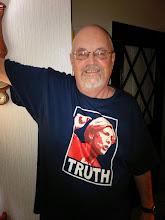Having found the Quakers some twenty-five years ago in
Madison, WI, I cannot cease but to be amazed at how their business and
decisions are carried out even though, to use a lay term, consensus is the only
decision making process used.
The basis of Quakerism, as opposed to other churches is
that decisions are made from the bottom up.
We have no hierarchy to tell us what to do—no minister, head priest, or priestess
(or Pope!)—just numerous Quaker meetings made up of like-minded individuals who
make the decisions for their particular monthly meeting. Individual, or “monthly”, meetings in a
geographic region are all part of a yearly meeting; the various yearly meetings make up one of the two national organizations—Friends United Meeting (FUM),
the evangelical, or conservative, branch of U.S. Quakerism; and Friends General
Conference (FGC), the un-programmed, or liberal, branch. Some yearly meetings are members of both
national organizations.
The decisions or “leadings” that bear fruit in the
monthly can spread to the yearly meeting and, possibly, to one of the two
national organizations. A prime example
of this is when the youth of the Sarasota Friends Meeting (my home meeting) became
involved with the Coalition of Immokalee Workers (CIW), an organization of
migrant workers in South Florida that is working for better pay and working
conditions for their workers. Our youth
took their message and activism to the annual gathering of Southeastern Yearly
Meeting. The youth of SEYM became quite
active and involved in the plight of the migrant workers and spread the word to
the youth of FGC, through the annual gathering this past summer in Colorado. As a result, that sense of activism has
sprouted roots in other areas of the country—thanks in large part to the young
ones in our own monthly meeting.
Un-programmed Quakers operate with a sense that God
(Divine Spirit; Friendly Presence; or however one defines their sense of a higher
spirit) is present within us all. We
believe we have a direct connection with that spirit and that we need no intermediary
to tell us what God wants us to do. It
is that sense of continuing revelation that guides us, not only in meetings for
worship and business, but in our daily lives, as well.
There is no “majority rule” or leaving any decision up to
a single person. It is a total and
complete meeting of the minds on how to proceed on any particular issue. Each person brings their bit of Light to the
matter being discussed in much the same way as several spotlight beams come together
on the stage to make them one where they intersect. This is known in Quakerism as “sense of the meeting”,
as opposed to the secular term of “consensus”.
To me, sense of the meeting also means that God has a voice in the
decision-making process.
Conversely, if one of the light beams does not intersect
with the others and illuminates a separate spot on the stage, there can be no
convergence of all the light being cast on that stage. As is Quaker practice, if one person has an
objection to a particular feeling or direction in which the meeting for business
is headed, they can voice their reservations and not allow a sense of the meeting
to prevail. A good example of this
happened in the Sarasota Friends Meeting many years ago. When it began, the meeting was a nomadic one,
gathering in several places for worship throughout Sarasota over the years. A group within the meeting felt it was time
to build their own meetinghouse and the idea spread. A building fund was established and started
to grow. However, there was one member
who felt it frivolous to spend money on the construction of a meetinghouse
until, at long last, he finally came around.
The proverbial straw that broke the camel’s back was when the meeting
was asked to vacate their regular worship space in one of the old Ringling
brothers’ mansions (now a part of New College of Florida). The recently installed college president
wanted it for his office. The surprising comment to the other members
was, “We need a meetinghouse!” Thus, the
“weighty” Friend’s Light merged with that of the others and the present
meetinghouse was built in 2001. Although
it took over twenty years, sense of the meeting was finally achieved.
One way a person who’s Light is not in sync with the
others in a Quaker meeting for business, but does not wish to stand in the way of a particular decision or action, is to “stand aside” and let the rest of
those in the meeting agree to carry out the decision. In the minutes of the business meeting’s
proceedings, the person can either remain anonymous or be recorded as standing
aside.
The democracy of Quakerism is a singular example of
people working together to reach a common goal.
Each member of any particular meeting has an equal voice in the decision making process. We have been referred to, over the years, as
a “peculiar people”—ones who operate under the principles of divine guidance
and sense of the meeting. We have no
need for intermediaries; we feel that compromise is not the giving in of one’s
conscience but the seeking out of divine will; we believe that all persons’
thoughts and utterances on a particular subject should be given equal value.
Yes, we are peculiar people, but I wouldn’t trade the
Quakers’ way of conducting themselves or their decision-making process for
anything else.
Tuesday, December 17, 2013
Subscribe to:
Post Comments (Atom)


No comments:
Post a Comment